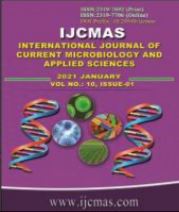


 National Academy of Agricultural Sciences (NAAS)
National Academy of Agricultural Sciences (NAAS)

|
PRINT ISSN : 2319-7692
Online ISSN : 2319-7706 Issues : 12 per year Publisher : Excellent Publishers Email : editorijcmas@gmail.com / submit@ijcmas.com Editor-in-chief: Dr.M.Prakash Index Copernicus ICV 2018: 95.39 NAAS RATING 2020: 5.38 |
The study investigated two outbreaks in khaki Campbell ducks to understand the predisposing factors and nature of virus involved in such outbreaks. Two outbreaks suspected of duck virus enteritis (DVE) were attended at BudBud and Krishnanagar villages of West Bengal. Gross lesions were recorded and samples were collected for histopathology, molecular detection and virus isolation. The outbreaks were diagnosed as DVE by characteristic pathological lesions, diagnostic PCR assay and virus isolation. The virus was primarily isolated in embryonated duck eggs and identified as duck enteritis virus (DEV). The virulence of both isolates was investigated in 28-day-old khaki Campbell ducklings (n=12). Three groups (Gr I, Gr II and Gr III) were designed with 4 ducklings in each group. Ducklings of Gr I and Gr II were infected intra peritoneally with 0.2 ml of chorioallantoic membrane (CAM) suspensions of DEV/BudBud/11 and DEV/ Nadia /12 virus isolates, respectively. In ducklings of Gr III, 0.2 ml of PBS was injected in same route. The clinical and pathological findings in both infected groups were characteristics of the DVE. Clinical signs were marked by loss of voice, anorexia, hyperthermia, dullness, unwilling to move, diarrhea, lameness, increased thirst and death. But there was difference in clinical course and features of diarrhea between two infected groups. Pathological findings were petechiation in heart, liver, spleen, kidney, proventriculus and intestine, atrophy of bursa with exudates in the lumen of both infected groups. There were inclusion bodies in hepatic cells and lymphoid cells. But most distinguished microscopic lesions were noticed in liver, proventriculus and bursa of Fabricius in both two groups. In conclusion, the investigation suggests to follow improved health care practices in backyard duck farming based on analysis of predisposing factors. Further the experimental study revealed that virus isolates associated in outbreaks are different in virulence and isolates may be explored in production of immune-diagnostics and attenuated live vaccine.
 |
 |
 |
 |
 |